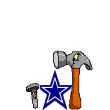- Messages
- 79,281
- Reaction score
- 45,652

NEW 'NO SPIKING' RULE NEEDS WORK by Michael David Smith
One of the NFL's new rules this season is a five-yard delay of game penalty on any player who spikes the ball on any non-scoring play. Yesterday Giants tight end Jeremy Shockey and Cowboys wide receiver Terrell Owens were both flagged for violating the rule.
The rule itself doesn't seem like a big deal, but it's clear from the way the rule was enforced (and not enforced) yesterday that the league didn't do a good enough job of thinking through the ramifications of the rules change.
Shockey committed his spike (actually, it was more like using one hand to bat the ball out of his other hand, but whatever) after a 14-yard catch on third-and-4. Packers defensive end Aaron Kampman had jumped offside on the play, and the officials ruled that the penalties offset, meaning they would re-play third-and-4.
Although NFL spokesman Greg Aiello tells me via e-mail that it was enforced properly, it seems like a strange way to enforce it. Shockey's penalty happened after the play was over, so the Giants should have been allowed to decline the offside, take the result of the play, and then have Shockey's penalty enforced prior to the next play, not as part of the previous play.
That's how it worked with the Owens spike, which he committed after a 28-yard catch on third-and-15. Owens' catch counted, but the Cowboys were moved back five yards from the spot where Owens was tackled.
Essentially, the way this rule is enforced means the Dolphins would have been much better off if they had committed a penalty on the play where Owens got his 28-yard catch.
Meanwhile, Patriots receiver Wes Welker spiked the ball after a catch against the Chargers last night, in plain view of at least one official, and there was no penalty. Aiello says, "it's a judgment call and the crew did not believe it was blatant enough to be penalized."
If the rule can't be enforced uniformly and in a way that everyone can understand, the league shouldn't have added it.
One of the NFL's new rules this season is a five-yard delay of game penalty on any player who spikes the ball on any non-scoring play. Yesterday Giants tight end Jeremy Shockey and Cowboys wide receiver Terrell Owens were both flagged for violating the rule.
The rule itself doesn't seem like a big deal, but it's clear from the way the rule was enforced (and not enforced) yesterday that the league didn't do a good enough job of thinking through the ramifications of the rules change.
Shockey committed his spike (actually, it was more like using one hand to bat the ball out of his other hand, but whatever) after a 14-yard catch on third-and-4. Packers defensive end Aaron Kampman had jumped offside on the play, and the officials ruled that the penalties offset, meaning they would re-play third-and-4.
Although NFL spokesman Greg Aiello tells me via e-mail that it was enforced properly, it seems like a strange way to enforce it. Shockey's penalty happened after the play was over, so the Giants should have been allowed to decline the offside, take the result of the play, and then have Shockey's penalty enforced prior to the next play, not as part of the previous play.
That's how it worked with the Owens spike, which he committed after a 28-yard catch on third-and-15. Owens' catch counted, but the Cowboys were moved back five yards from the spot where Owens was tackled.
Essentially, the way this rule is enforced means the Dolphins would have been much better off if they had committed a penalty on the play where Owens got his 28-yard catch.
Meanwhile, Patriots receiver Wes Welker spiked the ball after a catch against the Chargers last night, in plain view of at least one official, and there was no penalty. Aiello says, "it's a judgment call and the crew did not believe it was blatant enough to be penalized."
If the rule can't be enforced uniformly and in a way that everyone can understand, the league shouldn't have added it.




